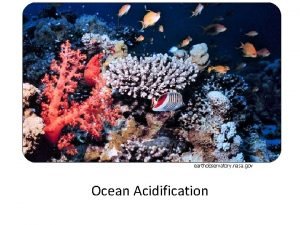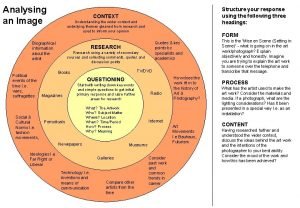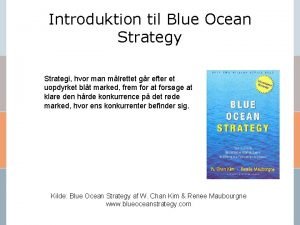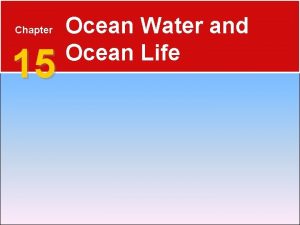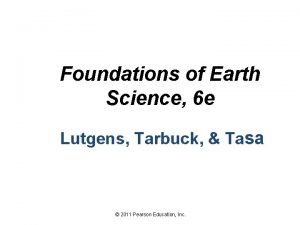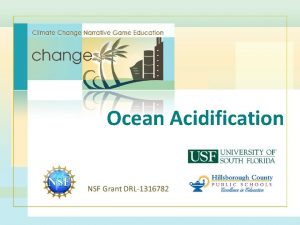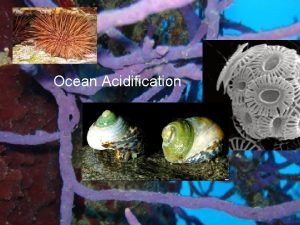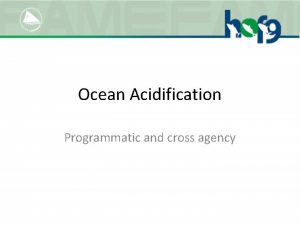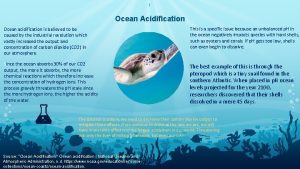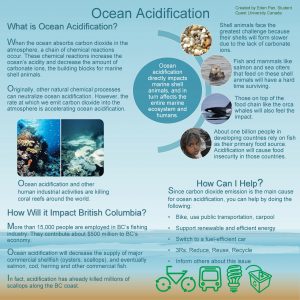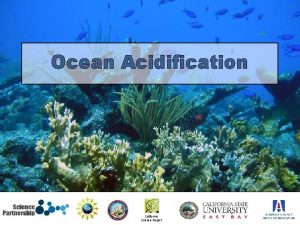Impacts of Ocean Acidification in a wider Context










- Slides: 10

Impacts of Ocean Acidification in a wider Context: Insights from IPCC SR 15 and Current Research Hans-O. Pörtner IPCC Working Group II Co-Chair Alfred Wegener Institute for Polar and Marine Research Event: Actions on Ocean Acidification – The Other CO 2 Problem COP 24, Katowice Room Narew 8 th December 2018

Effects of Ocean Warming and Acidification Limited understanding of fundamental processes

The consequences of thermal specialization, influenced by oxygen and CO 2, . . . biogeography IPCC AR 5 WGII Figure 6. 5

Complex Physiologies lead to variable thermal tolerance ranges across lifestages (Atlantic cod) 4. 3. 5. Spawners 4. Adults 3. Juveniles 2. Larvae 1. Eggs 2. 5. . . not yet considered in impact modelling Pörtner and Farrell, Science 2008 1.

Narrowing Thermal Range = Narrowing Spawning Habitat Ocean Acidification causes narrowing of embryonic thermal ranges, thereby affecting suitable spawning habitat Source: Dahlke et al. Sci. Adv. 2018; 4 : eaas 8821

≈4°C ≈2°C ≈1. 5°C Source: Dahlke et al. Sci. Adv. 2018; 4 : eaas 8821 Atlantic cod Change in maximum potential egg survival (PES, %) Shift in thermally suitable spawning habitat Polar cod

Assessing Risks LTGG 2 °C 1. 5°C Updated from IPCC AR 5

IPCC SR 15 Summary for Policy Makers “Fisheries and aquaculture are important to global food security but are already facing increasing risks from ocean warming and acidification (medium confidence), which will increase at 1. 5°C global warming. Risks are increasing for marine aquaculture and many fisheries at warming and acidification at 1. 5°C (e. g. , many bivalves such as oysters, and fin fish; medium confidence), especially at low latitudes (medium confidence). Small-scale fisheries in tropical regions, which are very dependent on habitat provided by coastal ecosystems such as coral reefs, mangroves, seagrass and kelp forests, are at a high risk at 1. 5°C due to loss of habitat (medium confidence). Risks of impacts and decreasing food security become greater as warming and acidification increase, with substantial losses likely for coastal livelihoods and industries (e. g. fisheries, aquaculture) as temperatures increase beyond 1. 5°C (medium to high confidence). {3. 4. 4, 3. 4. 5, 3. 4. 6, Box 3. 1, Box 3. 4, Box 3. 5, Cross-Chapter Box 6 in this Chapter} “


Thank you for your attention Contact IPCC WGII: tsu@ipcc-wg 2. awi. de Working Group II Technical Support Unit Intergovernmental Panel on Climate Change c/o Alfred Wegener Institute, Germany Further info IPCC: http: //www. ipcc. ch Instagram IPCC_Climate_Change Twitter @IPCC_CH Facebook @IPCC News
 Ocean acidification
Ocean acidification Non calcifiers examples
Non calcifiers examples The atlantic ocean gets about 3-5 ______ wider each year.
The atlantic ocean gets about 3-5 ______ wider each year. Wider context
Wider context Blue ocean strategy canvas
Blue ocean strategy canvas Convergent ocean to ocean
Convergent ocean to ocean Chapter 15 ocean water and ocean life wordwise answer key
Chapter 15 ocean water and ocean life wordwise answer key Ocean ocean convergent boundary
Ocean ocean convergent boundary Crack watc
Crack watc Convergent plate boundaries
Convergent plate boundaries Ocean to ocean convergent boundary
Ocean to ocean convergent boundary

